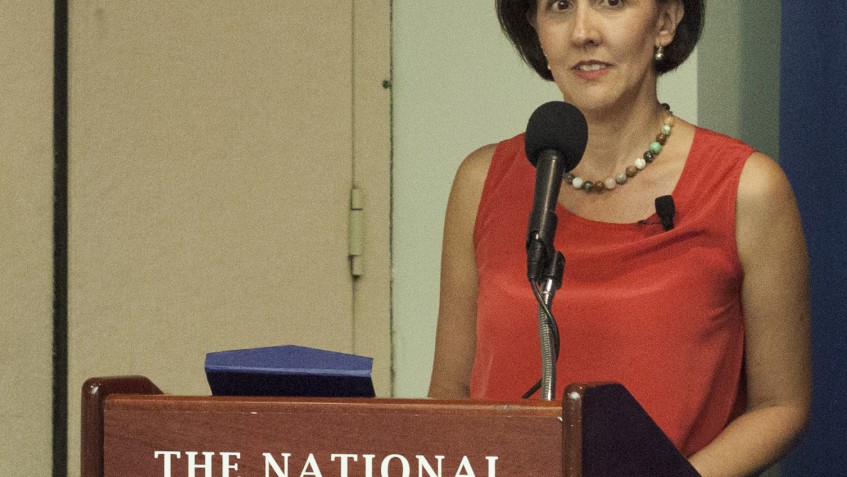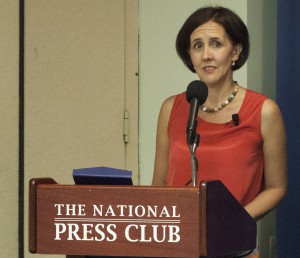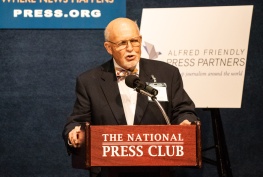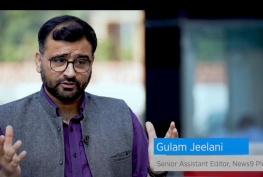Marina Walker Guevara said winning the Susan Talalay Award for Outstanding Journalism brought back memories of when she arrived 14 years ago from a small city in Argentina to join the Alfred Friendly fellowship program. She had never written an article in English, nor lived abroad.
Walker, now deputy director of the International Consortium of Investigative Journalists, said what followed were six months of intense training and reporting and writing at the Philadelphia Inquirer.
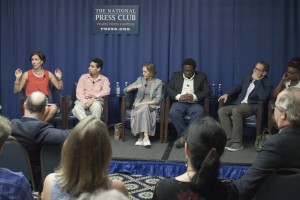
Marina Walker Guevara leads a discussion on investigative journalism with the Fellows after the award ceremony at The National Press Club on Sept. 10 in Washington D.C..
“It was in that newsroom, because of the many role models that I had, that I fully understood and embraced for the first time the idea of journalism as a moral force, and as a force for good,” Walker said, “that powerful American tradition of journalism as an indispensable watchdog, holding power and the powerful accountable, in the public interest. Not in the interest of any media corporation. Not in the interest of any government or political power. Not in my own interest.”
Walker is co-manager of the Panama Papers, the largest collaborative investigative project in journalism history. The project was kicked off by a data leak from a Panama-based offshore services provider to a German newspaper and shared by the International Consortium of Investigative Journalists. The documents revealed the secret owners of bank accounts and companies in 21 offshore jurisdictions and implicated more than 140 political leaders. The ongoing project exposed a system that enables crime, corruption and wrongdoing, hidden by secretive offshore companies. The articles triggered protests and government investigations, compelled reforms and caused government resignations, including the prime minister of Iceland.
ICIJ is a Washington-based network of nearly 200 investigative journalists from more than 65 countries who collaborate on in-depth investigative stories. Walker went to work there after finishing her fellowship and getting her master’s degree from the Missouri School of Journalism.
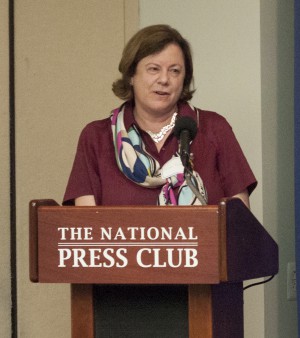
Susan Talalay, former director of Alfred Friendly Press Partners and board member of the Alfred Friendly Foundation
Susan Talalay, a former director of Alfred Friendly Press Partners and board member of the Alfred Friendly Foundation, said she had recently heard praise about Marina’s role in the Panama Papers from another former Fellow and investigative reporter involved in the project, Paul Radu of Romania.
Talalay, as she was presenting the award on Sept. 10 at the National Press Club, said Radu “talked about the trust that all these journalists felt for each other, so they were able to keep it secret for more than a year and continue doing their investigative work. So Marina, you embody this whole feeling of trust that is so important for journalism.”
The Panama Papers project launched with simultaneous publications of articles on April 3, but it took the team of more than a hundred journalists from around the world a full year to analyze, verify, interpret, report and write about the 11.5 million leaked files. They set up a “virtual newsroom” that looked like a Facebook page so that journalists around the world could share their findings and talk about their progress.
“It is a big honor,” Walker said before an audience of more than 70 people when Talalay handed her the award. “Thank you for recognizing my work, which has been influenced greatly by the opportunity that the Alfred Friendly program gave me to come to the U.S. to work alongside some of the best journalists and most committed journalists in the business.”
In a letter to Talalay that she quoted during the presentation, Walker wrote: “The fellowship was the best introduction I could possibly get to the great traditions of American journalism: its thoroughness, its independence, its fairness. Working at a newsroom with a rich history of hard hitting investigative reporting helped me fully understand and embrace journalism as a moral force, as a force for good. I learned that great reporting can have measurable impact and drive social change. To work in the public interest is still my biggest source of inspiration and motivation.”
Walker said the Panama Papers project demonstrated the limitations of the “old lone wolf paradigm” of investigative journalism. “What we experienced we like to call it a revolution of journalistic solidarity, perhaps the most defiant and the most modern form of journalism today, one in which bonds of trust among reporters and media houses supersede country and newsrooms, egos and scoops.”
“I have been privileged to participate in this changing paradigm of journalism, from isolation to collaboration, from national reporting to global reporting, from the vulnerability of the lone wolf to the strength and protection of the pack, the team,” Walker said. “That is why I am convinced that there has been no better time in history than this time to be an investigative reporter. I stand today on tall shoulders, including those of Alfred Friendly and his family, and my Philadelphia Inquirer mentors, and (former Alfred Friendly directors) Susan Albrecht and Susan Talalay. Thank you for inspiring me to continue today what I started in Philadelphia 14 years ago. Committed investigative reporting across borders and in the public interest.”
Listen to Marina Walker talk about her Alfred Friendly experience at the Philadelphia Inquirer:

